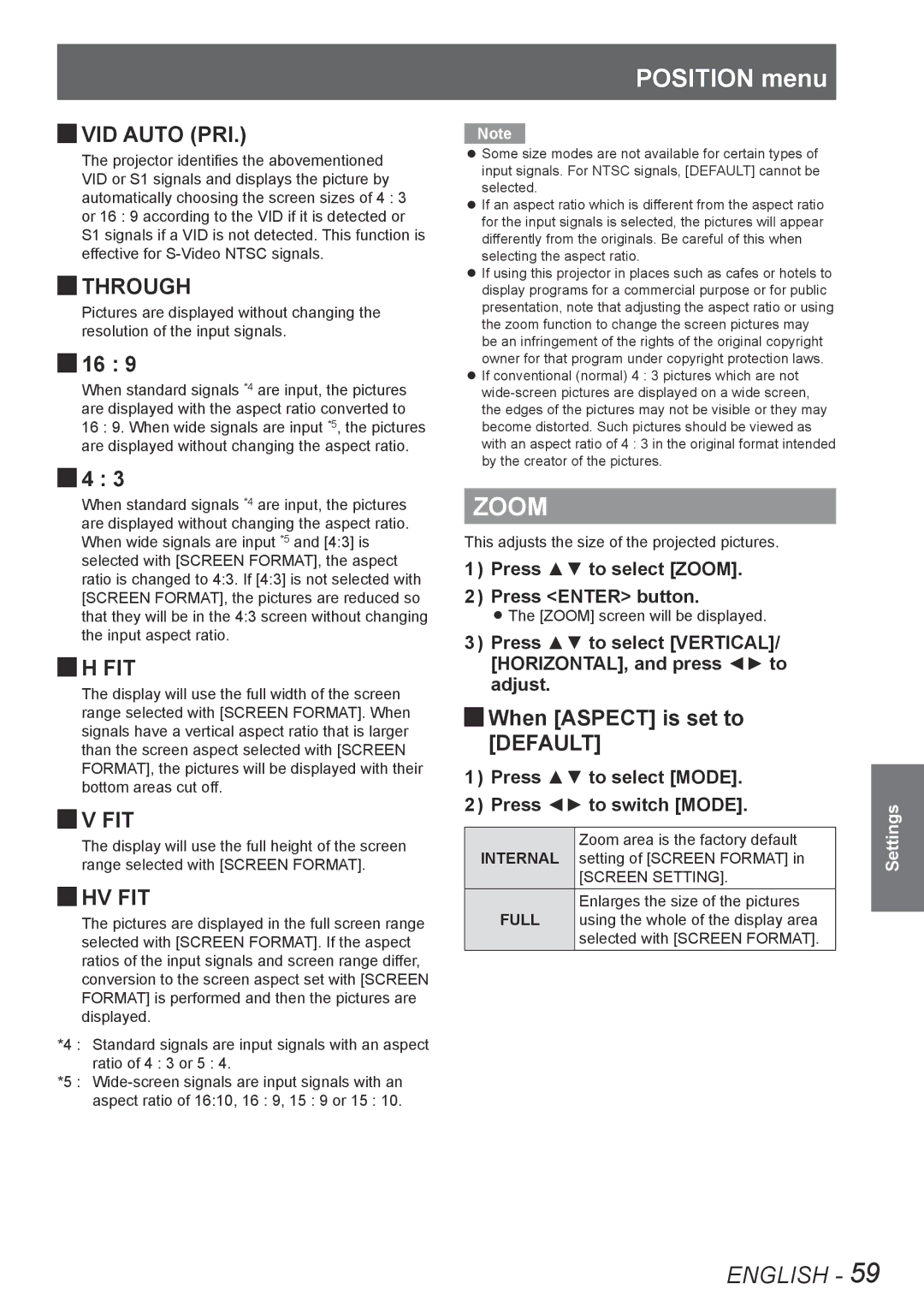
JJVID AUTO (PRI.)
The projector identifies the abovementioned VID or S1 signals and displays the picture by automatically choosing the screen sizes of 4 : 3 or 16 : 9 according to the VID if it is detected or S1 signals if a VID is not detected. This function is effective for
JJTHROUGH
Pictures are displayed without changing the resolution of the input signals.
JJ16 : 9
When standard signals *4 are input, the pictures are displayed with the aspect ratio converted to
16 : 9. When wide signals are input *5, the pictures are displayed without changing the aspect ratio.
JJ4 : 3
When standard signals *4 are input, the pictures are displayed without changing the aspect ratio. When wide signals are input *5 and [4:3] is selected with [SCREEN FORMAT], the aspect ratio is changed to 4:3. If [4:3] is not selected with [SCREEN FORMAT], the pictures are reduced so that they will be in the 4:3 screen without changing the input aspect ratio.
JJH FIT
The display will use the full width of the screen range selected with [SCREEN FORMAT]. When signals have a vertical aspect ratio that is larger than the screen aspect selected with [SCREEN FORMAT], the pictures will be displayed with their bottom areas cut off.
JJV FIT
The display will use the full height of the screen range selected with [SCREEN FORMAT].
JJHV FIT
The pictures are displayed in the full screen range selected with [SCREEN FORMAT]. If the aspect ratios of the input signals and screen range differ, conversion to the screen aspect set with [SCREEN FORMAT] is performed and then the pictures are displayed.
*****Standard signals are input signals with an aspect ratio of 4 : 3 or 5 : 4.
*****
POSITION menu
Note
zzSome size modes are not available for certain types of input signals. For NTSC signals, [DEFAULT] cannot be selected.
zzIf an aspect ratio which is different from the aspect ratio for the input signals is selected, the pictures will appear differently from the originals. Be careful of this when selecting the aspect ratio.
zzIf using this projector in places such as cafes or hotels to display programs for a commercial purpose or for public presentation, note that adjusting the aspect ratio or using the zoom function to change the screen pictures may be an infringement of the rights of the original copyright owner for that program under copyright protection laws.
zzIf conventional (normal) 4 : 3 pictures which are not
ZOOM
This adjusts the size of the projected pictures.
1111 Press ▲▼ to select [ZOOM].
2222 Press <ENTER> button.
zzThe [ZOOM] screen will be displayed.
3333 Press ▲▼ to select [VERTICAL]/ [HORIZONTAL], and press ◄► to adjust.
JJWhen [ASPECT] is set to [DEFAULT]
1111 Press ▲▼ to select [MODE].
2222 Press ◄► to switch [MODE].
INTERNAL | Zoom area is the factory default |
setting of [SCREEN FORMAT] in | |
| [SCREEN SETTING]. |
FULL | Enlarges the size of the pictures |
using the whole of the display area | |
| selected with [SCREEN FORMAT]. |
Settings
ENGLISH - 59
